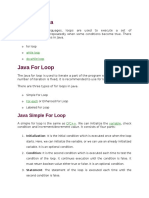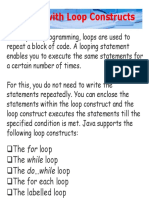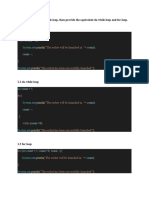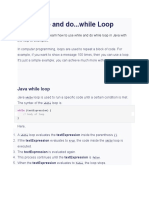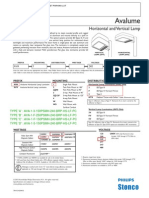0% found this document useful (0 votes)
33 views6 pagesWhile Loop
This document provides a comprehensive guide on while loops in Java, detailing their syntax, types, and best practices. It covers standard, infinite, sentinel-controlled, flag-controlled, and do-while loops, emphasizing the importance of loop termination and condition updates. The guide aims to enhance programming skills and promote efficient coding practices in Java.
Uploaded by
Dwight Jefferson SalarzonCopyright
© © All Rights Reserved
We take content rights seriously. If you suspect this is your content, claim it here.
Available Formats
Download as PDF, TXT or read online on Scribd
0% found this document useful (0 votes)
33 views6 pagesWhile Loop
This document provides a comprehensive guide on while loops in Java, detailing their syntax, types, and best practices. It covers standard, infinite, sentinel-controlled, flag-controlled, and do-while loops, emphasizing the importance of loop termination and condition updates. The guide aims to enhance programming skills and promote efficient coding practices in Java.
Uploaded by
Dwight Jefferson SalarzonCopyright
© © All Rights Reserved
We take content rights seriously. If you suspect this is your content, claim it here.
Available Formats
Download as PDF, TXT or read online on Scribd
/ 6
























